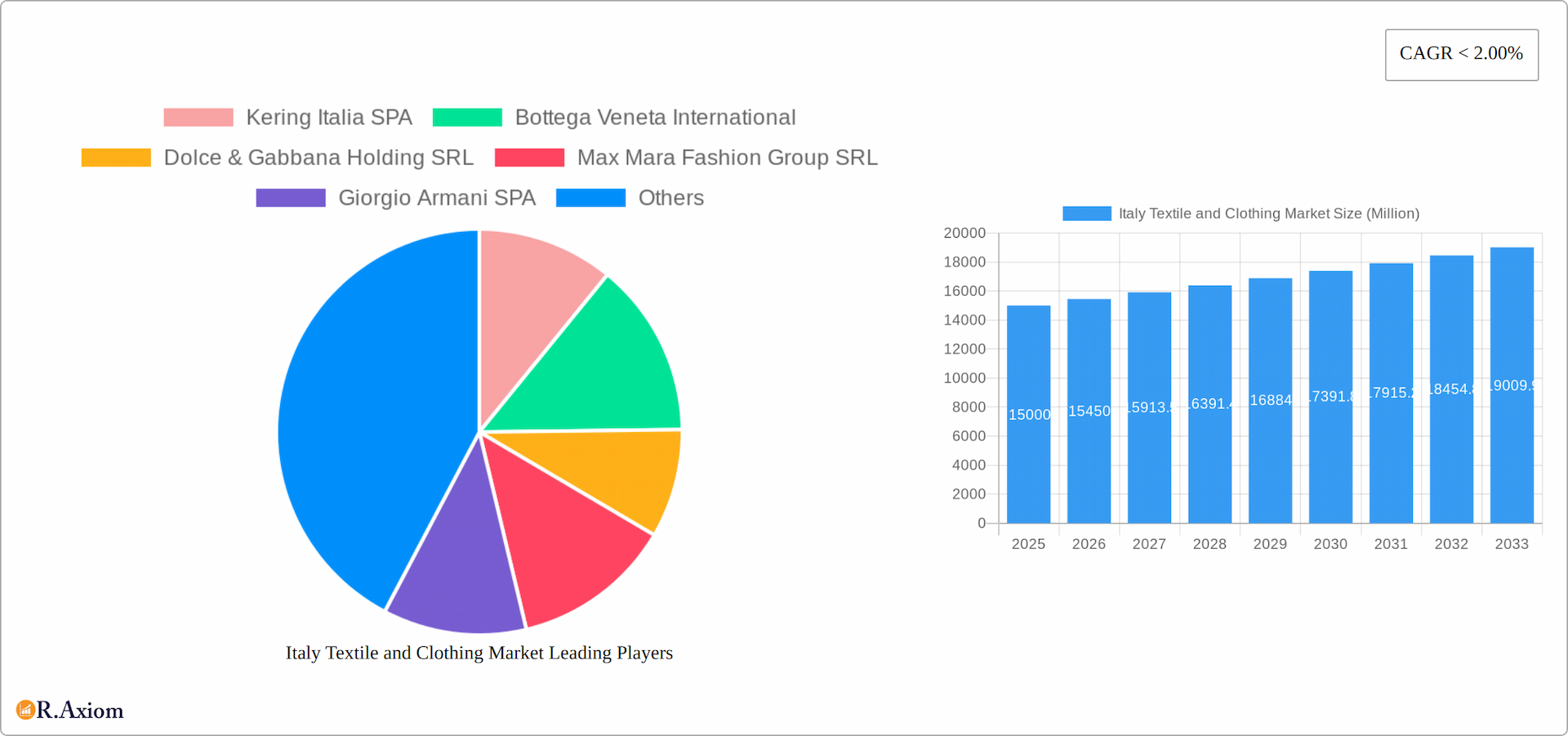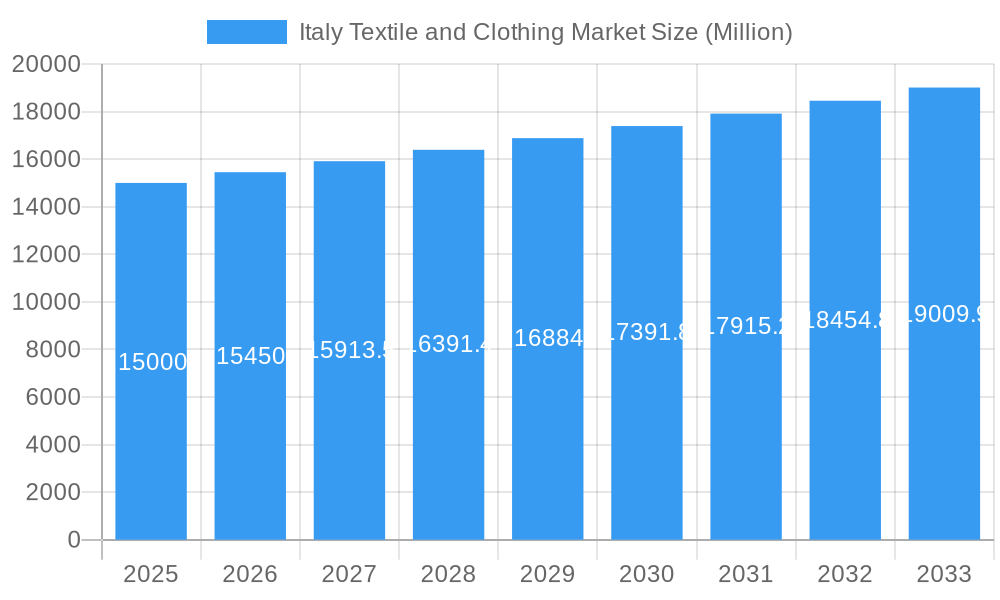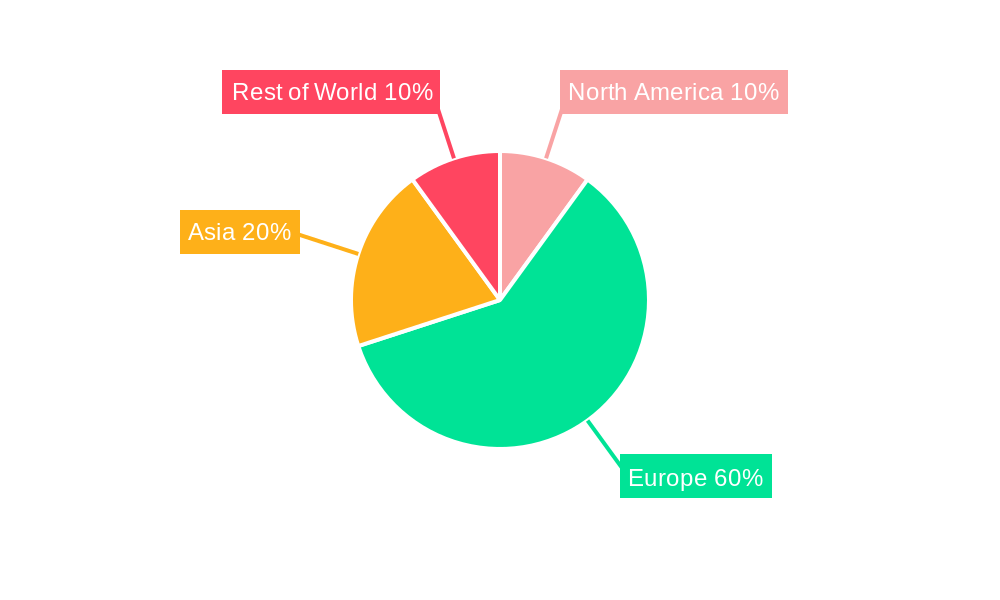Key Insights
The Italy Textile and Clothing Market exhibits significant growth potential, driven by innovation, demand for sustainable fashion, and the enduring appeal of Italian craftsmanship. While global competition and evolving consumer preferences present challenges, the market is poised for expansion. The forecast period (2025-2033) anticipates continued growth, supported by resurgent domestic tourism, increasing demand for ethically produced garments, and advancements in textile technology. Key growth drivers include the resurgence of domestic tourism, growing consumer preference for sustainable and ethically sourced clothing, and the inherent strength of Italian design and manufacturing expertise. Innovations in performance fabrics and smart textiles will further stimulate market growth.

Italy Textile and Clothing Market Market Size (In Billion)

The Compound Annual Growth Rate (CAGR) for the Italy Textile and Clothing Market from 2025 to 2033 is projected at 2.7%. With a base year market size of €26.9 billion in 2024, this CAGR indicates a consistent market expansion. Strategic investments in research and development, alongside targeted marketing campaigns for both domestic and international markets, are crucial for competitive advantage. Leveraging the strong "Made in Italy" brand reputation and fostering customer loyalty will be paramount for sustained success.

Italy Textile and Clothing Market Company Market Share

This comprehensive report offers an in-depth analysis of the Italian textile and clothing market from 2019 to 2033. It provides critical insights for stakeholders, investors, and decision-makers navigating market dynamics, growth opportunities, and competitive landscapes. The study utilizes robust data and advanced forecasting methodologies for accurate projections. The analysis covers the historical period (2019-2024) and the forecast period (2025-2033), with 2024 serving as the base year.
Italy Textile and Clothing Market Market Concentration & Innovation
This section analyzes the market concentration, innovation drivers, regulatory landscape, product substitutes, end-user trends, and mergers & acquisitions (M&A) activities within the Italian textile and clothing market. The Italian textile and clothing industry presents a diverse landscape, encompassing both large multinational corporations and smaller, specialized businesses. Key market leaders, including Kering Italia SPA (Kering Italia SPA), Bottega Veneta International (Bottega Veneta International), Dolce & Gabbana Holding SRL (Dolce & Gabbana Holding SRL), Max Mara Fashion Group SRL (Max Mara Fashion Group SRL), Giorgio Armani SPA (Giorgio Armani SPA), and Ferragamo Finanziaria SPA (Ferragamo Finanziaria SPA), command significant market share. However, a multitude of smaller players cater to niche segments, contributing to the market's overall dynamism.
- Market Share: While precise figures remain elusive due to the confidential nature of many companies' financial data, the top five companies hold a substantial portion of the market share, estimated at approximately [Insert Estimated Percentage]% collectively. Further research and analysis are needed for a more detailed breakdown.
- Innovation Drivers: The Italian textile and clothing industry is propelled by several key innovation drivers. Sustainability initiatives, encompassing ethical sourcing and eco-friendly materials, are paramount. Simultaneously, technological advancements in manufacturing processes, such as automation and precision cutting techniques, and the integration of digital technologies including 3D printing, AI-driven design software, and advanced supply chain management systems, are transforming the sector.
- Regulatory Framework: The Italian textile industry operates within a framework shaped by EU regulations. These regulations cover various aspects of textile production, encompassing environmental standards, labeling requirements, and worker safety protocols. Compliance with these regulations is crucial for market participation.
- Product Substitutes: The Italian textile and clothing market faces competition from various sources, notably synthetic fabrics and fast fashion brands. While the high-end luxury sector remains comparatively less affected, mid-market segments experience greater pressure from these substitutes. This necessitates continuous innovation and differentiation strategies.
- End-User Trends: Consumer preferences are evolving significantly, driving changes across the industry. There's a growing demand for sustainable and ethically produced apparel, reflecting increasing consumer awareness. Simultaneously, personalized experiences and bespoke offerings are gaining traction, catering to the desire for unique and customized items.
- M&A Activities: Consolidation within the Italian textile and clothing industry is evident through several notable M&A transactions. A prime example is Ermenegildo Zegna Group’s acquisition of a majority stake in Tessitura Ubertino in June 2021, estimated at [Insert Estimated Value] Million, reflecting strategic consolidation efforts. The overall M&A deal value during the 2019-2024 period is estimated at [Insert Estimated Value] Million, indicating significant activity and investment in the sector.
Italy Textile and Clothing Market Industry Trends & Insights
The Italian textile and clothing market demonstrates a dynamic interplay of growth drivers, technological disruptions, consumer preferences, and competitive dynamics. The market witnessed a CAGR of xx% during the historical period (2019-2024). Market penetration of sustainable and ethically sourced products is gradually increasing, currently estimated at xx%. Luxury brands benefit from high demand in international markets and the strength of the 'Made in Italy' label. The increasing integration of technology in design, manufacturing, and supply chain management is transforming the industry. E-commerce channels are rapidly expanding their reach and market share. Consumer preferences are shifting towards personalized products, sustainable materials, and transparency in supply chains. Intense competition, both domestically and internationally, necessitates continuous innovation and adaptation to maintain market share.
Dominant Markets & Segments in Italy Textile and Clothing Market
The Italian textile and clothing market is geographically diverse, with the Northern regions (particularly Lombardy and Veneto) exhibiting the strongest dominance due to established manufacturing clusters, skilled labor, and a robust infrastructure supporting the sector.
- Key Drivers of Northern Region Dominance:
- Well-developed infrastructure (logistics, transport).
- Clustered presence of skilled labor and specialized manufacturing expertise.
- Strong network of suppliers and supporting industries.
- Access to financial resources and supportive government policies.
The luxury segment holds a significant share, driven by the global appeal of Italian craftsmanship and high-quality materials, while the mid-range and budget segments also represent substantial market share with varying growth prospects depending on consumer preferences and economic conditions.
Italy Textile and Clothing Market Product Developments
Recent product innovations focus on sustainable materials (e.g., recycled fabrics, organic cotton), advanced manufacturing techniques (e.g., 3D knitting, laser cutting), and incorporating smart technologies (e.g., wearable sensors, connected apparel). These developments aim to enhance product quality, performance, and sustainability while providing competitive advantages in the market.
Report Scope & Segmentation Analysis
The report segments the market based on product type (e.g., apparel, textiles, accessories), end-use industry (e.g., fashion, sportswear, home textiles), and distribution channel (e.g., retail stores, e-commerce, wholesale). Each segment is analyzed to determine growth projections, market size, and competitive dynamics. For example, the luxury segment is expected to grow at a CAGR of xx% during the forecast period, while the mid-range segment is projected to see a CAGR of xx%.
Key Drivers of Italy Textile and Clothing Market Growth
The Italian textile and clothing market is driven by several factors: growing demand for luxury goods internationally, increasing adoption of sustainable and ethical practices, technological innovations improving efficiency and product quality, and government initiatives supporting the sector. The strengthening of the 'Made in Italy' brand globally further bolsters the market.
Challenges in the Italy Textile and Clothing Market Sector
Challenges include intense global competition from lower-cost manufacturing locations, fluctuations in raw material prices, environmental regulations, and the need to adapt to evolving consumer preferences and technological advancements. Supply chain disruptions and rising labor costs also pose significant challenges to profitability. These factors can collectively impact market growth by approximately xx% during the forecast period if not appropriately addressed.
Emerging Opportunities in Italy Textile and Clothing Market
Emerging opportunities lie in expanding into new markets (e.g., Asia, Africa), leveraging e-commerce platforms, developing innovative sustainable materials, incorporating digital technologies throughout the value chain, and personalizing product offerings. The potential for growth in these areas is significant, with a potential market expansion of xx% predicted by 2033.
Leading Players in the Italy Textile and Clothing Market Market
- Kering Italia SPA
- Bottega Veneta International
- Dolce & Gabbana Holding SRL
- Max Mara Fashion Group SRL
- Giorgio Armani SPA
- Ferragamo Finanziaria SPA
- Vicuna Holding SPA
- Christian Dior Italia SRL
- Fedone SRL
- OTB SPA
- Di Vi Finanziaria Di Diego Della Valle & C SRL
- Lir SRL
- (List Not Exhaustive)
Key Developments in Italy Textile and Clothing Market Industry
- April 2021: Kering enhances its global logistics capabilities with a new hub in Northern Italy, increasing shipping capacity to 80 Million pieces per year and storage to 20 Million pieces, reducing lead times by 50%.
- June 2021: Ermenegildo Zegna Group acquires a majority stake (approximately 60%) in Tessitura Ubertino, an Italian textile firm. This strategic acquisition signifies increased vertical integration within the luxury segment.
Strategic Outlook for Italy Textile and Clothing Market Market
The future of the Italian textile and clothing market appears promising. Sustained growth is anticipated, driven by the ongoing appeal of Italian design and craftsmanship, the incorporation of innovative technologies, and the increasing emphasis on sustainability and ethical production. Strategic partnerships, investments in R&D, and effective brand management will be crucial for companies to thrive in this competitive landscape. The predicted CAGR for the forecast period (2025-2033) is xx%.
Italy Textile and Clothing Market Segmentation
-
1. Application
- 1.1. Clothing Application
- 1.2. Industrial Application
- 1.3. Household Application
-
2. Material
- 2.1. Cotton
- 2.2. Jute
- 2.3. Silk
- 2.4. Wool
- 2.5. Synthetic
- 2.6. Other
-
3. Process
- 3.1. Woven
- 3.2. Non-Woven
Italy Textile and Clothing Market Segmentation By Geography
- 1. Italy

Italy Textile and Clothing Market Regional Market Share

Geographic Coverage of Italy Textile and Clothing Market
Italy Textile and Clothing Market REPORT HIGHLIGHTS
| Aspects | Details |
|---|---|
| Study Period | 2020-2034 |
| Base Year | 2025 |
| Estimated Year | 2026 |
| Forecast Period | 2026-2034 |
| Historical Period | 2020-2025 |
| Growth Rate | CAGR of 2.7% from 2020-2034 |
| Segmentation |
|
Table of Contents
- 1. Introduction
- 1.1. Research Scope
- 1.2. Market Segmentation
- 1.3. Research Methodology
- 1.4. Definitions and Assumptions
- 2. Executive Summary
- 2.1. Introduction
- 3. Market Dynamics
- 3.1. Introduction
- 3.2. Market Drivers
- 3.3. Market Restrains
- 3.4. Market Trends
- 3.4.1. Decreasing Consumption Expenditure on Textile
- 4. Market Factor Analysis
- 4.1. Porters Five Forces
- 4.2. Supply/Value Chain
- 4.3. PESTEL analysis
- 4.4. Market Entropy
- 4.5. Patent/Trademark Analysis
- 5. Italy Textile and Clothing Market Analysis, Insights and Forecast, 2020-2032
- 5.1. Market Analysis, Insights and Forecast - by Application
- 5.1.1. Clothing Application
- 5.1.2. Industrial Application
- 5.1.3. Household Application
- 5.2. Market Analysis, Insights and Forecast - by Material
- 5.2.1. Cotton
- 5.2.2. Jute
- 5.2.3. Silk
- 5.2.4. Wool
- 5.2.5. Synthetic
- 5.2.6. Other
- 5.3. Market Analysis, Insights and Forecast - by Process
- 5.3.1. Woven
- 5.3.2. Non-Woven
- 5.4. Market Analysis, Insights and Forecast - by Region
- 5.4.1. Italy
- 5.1. Market Analysis, Insights and Forecast - by Application
- 6. Competitive Analysis
- 6.1. Market Share Analysis 2025
- 6.2. Company Profiles
- 6.2.1 Kering Italia SPA
- 6.2.1.1. Overview
- 6.2.1.2. Products
- 6.2.1.3. SWOT Analysis
- 6.2.1.4. Recent Developments
- 6.2.1.5. Financials (Based on Availability)
- 6.2.2 Bottega Veneta International
- 6.2.2.1. Overview
- 6.2.2.2. Products
- 6.2.2.3. SWOT Analysis
- 6.2.2.4. Recent Developments
- 6.2.2.5. Financials (Based on Availability)
- 6.2.3 Dolce & Gabbana Holding SRL
- 6.2.3.1. Overview
- 6.2.3.2. Products
- 6.2.3.3. SWOT Analysis
- 6.2.3.4. Recent Developments
- 6.2.3.5. Financials (Based on Availability)
- 6.2.4 Max Mara Fashion Group SRL
- 6.2.4.1. Overview
- 6.2.4.2. Products
- 6.2.4.3. SWOT Analysis
- 6.2.4.4. Recent Developments
- 6.2.4.5. Financials (Based on Availability)
- 6.2.5 Giorgio Armani SPA
- 6.2.5.1. Overview
- 6.2.5.2. Products
- 6.2.5.3. SWOT Analysis
- 6.2.5.4. Recent Developments
- 6.2.5.5. Financials (Based on Availability)
- 6.2.6 Ferragamo Finanziaria SPA
- 6.2.6.1. Overview
- 6.2.6.2. Products
- 6.2.6.3. SWOT Analysis
- 6.2.6.4. Recent Developments
- 6.2.6.5. Financials (Based on Availability)
- 6.2.7 Vicuna Holding SPA
- 6.2.7.1. Overview
- 6.2.7.2. Products
- 6.2.7.3. SWOT Analysis
- 6.2.7.4. Recent Developments
- 6.2.7.5. Financials (Based on Availability)
- 6.2.8 Christian Dior Italia SRL
- 6.2.8.1. Overview
- 6.2.8.2. Products
- 6.2.8.3. SWOT Analysis
- 6.2.8.4. Recent Developments
- 6.2.8.5. Financials (Based on Availability)
- 6.2.9 Fedone SRL
- 6.2.9.1. Overview
- 6.2.9.2. Products
- 6.2.9.3. SWOT Analysis
- 6.2.9.4. Recent Developments
- 6.2.9.5. Financials (Based on Availability)
- 6.2.10 OTB SPA
- 6.2.10.1. Overview
- 6.2.10.2. Products
- 6.2.10.3. SWOT Analysis
- 6.2.10.4. Recent Developments
- 6.2.10.5. Financials (Based on Availability)
- 6.2.11 Di Vi Finanziaria Di Diego Della Valle & C SRL
- 6.2.11.1. Overview
- 6.2.11.2. Products
- 6.2.11.3. SWOT Analysis
- 6.2.11.4. Recent Developments
- 6.2.11.5. Financials (Based on Availability)
- 6.2.12 Lir SRL**List Not Exhaustive
- 6.2.12.1. Overview
- 6.2.12.2. Products
- 6.2.12.3. SWOT Analysis
- 6.2.12.4. Recent Developments
- 6.2.12.5. Financials (Based on Availability)
- 6.2.1 Kering Italia SPA
List of Figures
- Figure 1: Italy Textile and Clothing Market Revenue Breakdown (billion, %) by Product 2025 & 2033
- Figure 2: Italy Textile and Clothing Market Share (%) by Company 2025
List of Tables
- Table 1: Italy Textile and Clothing Market Revenue billion Forecast, by Application 2020 & 2033
- Table 2: Italy Textile and Clothing Market Revenue billion Forecast, by Material 2020 & 2033
- Table 3: Italy Textile and Clothing Market Revenue billion Forecast, by Process 2020 & 2033
- Table 4: Italy Textile and Clothing Market Revenue billion Forecast, by Region 2020 & 2033
- Table 5: Italy Textile and Clothing Market Revenue billion Forecast, by Application 2020 & 2033
- Table 6: Italy Textile and Clothing Market Revenue billion Forecast, by Material 2020 & 2033
- Table 7: Italy Textile and Clothing Market Revenue billion Forecast, by Process 2020 & 2033
- Table 8: Italy Textile and Clothing Market Revenue billion Forecast, by Country 2020 & 2033
Frequently Asked Questions
1. What is the projected Compound Annual Growth Rate (CAGR) of the Italy Textile and Clothing Market?
The projected CAGR is approximately 2.7%.
2. Which companies are prominent players in the Italy Textile and Clothing Market?
Key companies in the market include Kering Italia SPA, Bottega Veneta International, Dolce & Gabbana Holding SRL, Max Mara Fashion Group SRL, Giorgio Armani SPA, Ferragamo Finanziaria SPA, Vicuna Holding SPA, Christian Dior Italia SRL, Fedone SRL, OTB SPA, Di Vi Finanziaria Di Diego Della Valle & C SRL, Lir SRL**List Not Exhaustive.
3. What are the main segments of the Italy Textile and Clothing Market?
The market segments include Application, Material, Process.
4. Can you provide details about the market size?
The market size is estimated to be USD 26.9 billion as of 2022.
5. What are some drivers contributing to market growth?
N/A
6. What are the notable trends driving market growth?
Decreasing Consumption Expenditure on Textile.
7. Are there any restraints impacting market growth?
N/A
8. Can you provide examples of recent developments in the market?
April 2021- Kering enhances its global logistics capabilities with a new hub in Northern Italy.The hub will meet the demand from regional warehouses, retail stores, wholesalers and e-commerce worldwide, and will significantly increase the Group's capabilities in terms of shipping (up to 80 million pieces per year) and storage (up to 20 million pieces). It will also allow to reduce lead times by 50% by increasing the speed of deliveries and to enhance collaboration with the Group's brands.
9. What pricing options are available for accessing the report?
Pricing options include single-user, multi-user, and enterprise licenses priced at USD 3800, USD 4500, and USD 5800 respectively.
10. Is the market size provided in terms of value or volume?
The market size is provided in terms of value, measured in billion.
11. Are there any specific market keywords associated with the report?
Yes, the market keyword associated with the report is "Italy Textile and Clothing Market," which aids in identifying and referencing the specific market segment covered.
12. How do I determine which pricing option suits my needs best?
The pricing options vary based on user requirements and access needs. Individual users may opt for single-user licenses, while businesses requiring broader access may choose multi-user or enterprise licenses for cost-effective access to the report.
13. Are there any additional resources or data provided in the Italy Textile and Clothing Market report?
While the report offers comprehensive insights, it's advisable to review the specific contents or supplementary materials provided to ascertain if additional resources or data are available.
14. How can I stay updated on further developments or reports in the Italy Textile and Clothing Market?
To stay informed about further developments, trends, and reports in the Italy Textile and Clothing Market, consider subscribing to industry newsletters, following relevant companies and organizations, or regularly checking reputable industry news sources and publications.
Methodology
Step 1 - Identification of Relevant Samples Size from Population Database



Step 2 - Approaches for Defining Global Market Size (Value, Volume* & Price*)

Note*: In applicable scenarios
Step 3 - Data Sources
Primary Research
- Web Analytics
- Survey Reports
- Research Institute
- Latest Research Reports
- Opinion Leaders
Secondary Research
- Annual Reports
- White Paper
- Latest Press Release
- Industry Association
- Paid Database
- Investor Presentations

Step 4 - Data Triangulation
Involves using different sources of information in order to increase the validity of a study
These sources are likely to be stakeholders in a program - participants, other researchers, program staff, other community members, and so on.
Then we put all data in single framework & apply various statistical tools to find out the dynamic on the market.
During the analysis stage, feedback from the stakeholder groups would be compared to determine areas of agreement as well as areas of divergence


